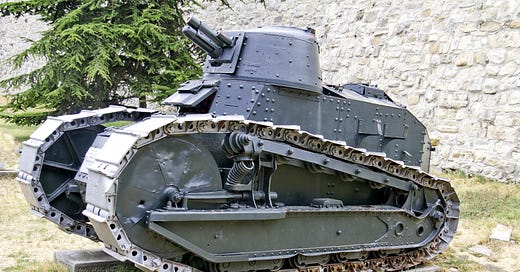We are entering a period in which the defense will dominate warfare, probably for decades to come. Force projection, the tool of American foreign policy for more than a century, is about to become all but impossible costly.
The previous defensive era peaked in WWI as the combination of the machine gun, barbed wire, and even the airplane—which compromised the ability of the offense to mass in secret—made offensive maneuvering almost impossibly bloody.
The cavalry, the perfect expression of offensive futility, died in that war. As for defense, even the fort, mocked by the advocates of offensive maneuver, though useless in Belgium, served the French well in the Marne. And what were trenches but long, low forts stretching for miles across the front.
At sea, the submarine nearly strangled allied supply lines, always the weak point of the offense. The vaunted British navy, for centuries the main tool of British force projection, fought one major set piece battle against the German navy at Jutland. The result was a draw. The main accomplishment of the Navy was the blockade of Germany, again a defensive attack on supply lines.
Peak defense naturally provoked offensive innovation. To get through the trenches Germany developed open order storm troop tactics, followed by the French, who taught them to the Americans, who fresh on the battlefield, defeated Germany. The tank, though only marginally useful in WWI, was the most dramatic break through for the offense on the land, a harbinger of offensive resurgence.
That war ended before the first true aircraft carrier, the British Argus, could see action. The carrier, however, would prove to be perhaps the greatest tool of force projection in all history, even deluding the Japanese into thinking they might successfully take on the U.S.
As the tank and the carrier matured in the interval between to two wars, the advantage in war shifted decisively to the offense, where it remained for almost 100 years.
Multiple independently targeted nuclear war heads atop an ICBM were the culmination of offensive dominance, so much so that they actually discouraged conventional offensive campaigns. Fear of Soviet nukes was at least part of the reason we never invaded North Vietnam. That fear may have been the entire reason the Soviets never moved against West Germany despite their overwhelming advantage in ground forces. The same fear is the reason Ukraine fights on alone.
We are, by all appearances, at peak offense.
The peak has passed. As the deadlock in Ukraine now suggests, we have entered an era of defensive dominance. Neutered are, or soon will be, every weapon that favored the offense for all these decades. First to go, though the U.S. Navy has yet to notice, was the aircraft carrier, which has been obsolete for a half century, its uselessness masked only by the fact that no U.S. aircraft carrier has been attacked by a competent enemy in all that time. The tank died in Ukraine. The air force is about to go. The ballistic missile has been weighed in the balance and found wanting.
Our narcissistic or narcoleptic leaders show no signs of realizing this and certainly no signs of doing anything about it. Yet if we are to lose our democracy in the next few decades, the most likely cause will not be sending some vile Republican or decrepit Democrat to the White House, but losing a war to a major power that has grasped current military reality while we waste continue to waste trillions on the weapons of the last war.
To be continued




Thought provoking piece Richard. Have you read the biography or writings of John C. Boyd? Great American pragmatist philosopher of war and mind behind the F-16. Among many things, he said Initiative was the thing -- on both offense and defense.
It was the Royal Naval blockade that actually ended WWI. The main effect of US entry into that war was to enable the blockade to be complete. Before that, the US, as a neutral country, could effectively run the blockade. I wouldn't call a blockade "defensive". If anything, it is a strategic offense. It ended the Crimean War, and (on land) enabled the victory of Kublai Khan.